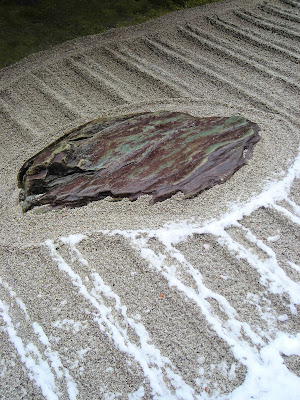13th June 2008
And here's another column because I, er, just wanted to post pictures of this year's sakura.
...
The pink mist is still swirling in my brain.
Once a year, a peculiar malaise grips the whole of Japan and the symptoms are most easily observed from March to May, with the cases peaking in April.
The malaise is called sakura fever and I have been identified as a carrier since last year.
The virus lies dormant for most of the year but when March melts winter from the air, the symptoms begin to flare up.
Sufferers find themselves checking television and Internet reports repeatedly for predictions of when the cherry blossom will bloom and once it does, track its progress with bloodhound focus from the south to the tip of Hokkaido in the north.
It is not an obsession; it is an epidemic.
 Here are a few of the classic symptoms: Laying blue tarpaulin sheets under cherry trees, plonking friends, family or colleagues on them and buying up box-loads of yakisoba, sakura mochi and hanami dango.
Here are a few of the classic symptoms: Laying blue tarpaulin sheets under cherry trees, plonking friends, family or colleagues on them and buying up box-loads of yakisoba, sakura mochi and hanami dango. The fried noodles and rice cakes and balls all translate into an insane infusion of calories, as do the fountains of beer, which is not drunk so much as soaked up.
But because so many people are infected with sakura fever, competition for a spot under the trees can be stiff. So some resort to arriving early, staking out a space with the blue plastic – and parking one member of their party on top of it.
This lot usually falls to the youngest and most junior person. Not because the young and the junior are the easiest to bully but because their youth means that they have the highest resistance to prolonged exposure to the source of infection.
While there is no known cure for the sakura fever virus, folk remedies involving alcohol abound.
But anecdotal evidence shows that alcohol has little effect against the virus. If anything, it accelerates the uninhibited singing, outrageous chat-up lines and other forms of behaviour unthinkable under normal circumstances.
 Even uninfected passers-by are not safe from the excesses at the nightly parties as the constant explosion of camera flashes have been known to cause temporary loss of vision.
Even uninfected passers-by are not safe from the excesses at the nightly parties as the constant explosion of camera flashes have been known to cause temporary loss of vision. Be advised that the over-use of cameras and other photographic devices is a common sign of sakura fever. If travelling to areas where the virus is endemic, take precautions. Take sunglasses.
So virulent is the fever that no insurance plan in the world will cover it.
Yet though the virus has been active in Japan since at least the eighth century, surprisingly little has been written about how the disease is transmitted.
However, the word for the parties under the trees may offer a clue: hanami. Literally ‘flower-see’ or ‘flower-view’, it suggests that infection is spread through the eyes.
It is certainly true that most people seeing a cherry tree in full bloom will show the same signs of slackened jaw and glazed eyes almost immediately.
If not physically restrained, they will move towards the tree and stay under it for as long as they can. Similar behaviour has been observed in moths in the presence of a flame.
Furthermore, it has been hypothesised that the virus impels sufferers to move to the closest cherry tree as if, through renewed exposure to the cause of infection, it can stop the body from developing an immune response.
Work on creating a vaccine for the virus shows little signs of progress to date. This is mainly because researchers, when attempting to take samples, usually end up abandoning their work to go in search of beer and blue tarpaulin.
However, some argue that the source of sakura fever is not a virus but a bacterium – and a beneficial one at that.
Just as humans function better with the right bacteria in their digestive tract, those with sakura in their system show higher levels of sociability as anyone invited on the spot to a stranger’s hanami party will attest.
It has been said that the ability of blooming sakura trees to reduce inhibition explains why they are valued as safety valves, especially in societies which normally set a premium on self-control.
But perhaps the greatest contribution of sakura is not to the group but to the individual.
Almost everyone exposed to cherry blossoms reports an enhanced sense of well-being. They describe what epidemiologists would call joy if it were not such an unscientific term. And easy to spell.
It does not seem to matter whether the sakura in question is white or pink enough to suggest flamingos overdosing on food colouring.
It does not matter whether the flowers are gathered in tight bunches or trail along spindly branches that stir like a woman’s hair in the wind.
All it takes is one glance at a cherry tree in flower for delight to rush in and billow up into joy.
And that is why if I ever suspect that I am in danger of developing an immunity to sakura, I will sit under a thousand cherry trees, a blue sheet beneath me, until the roots have entwined themselves in my bones and the blooms dissolved in my blood beyond all possibility of a cure.








